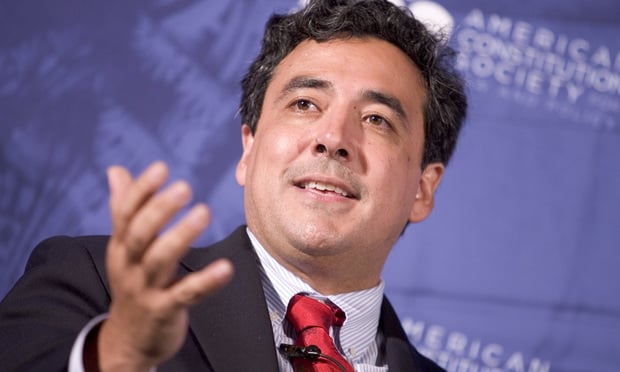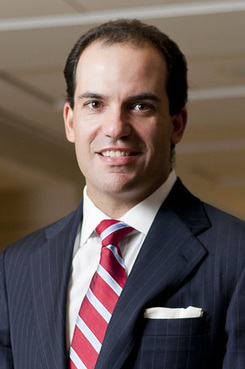US Solicitor Weighs New Supreme Court Challenge to Vietnam Veteran Benefits
The Veterans Benefits Administration anticipates that "tens of thousands of veterans" will file claims within the first year if the Federal Circuit ruling is not put on hold,
February 06, 2019 at 03:07 PM
5 minute read
The original version of this story was published on National Law Journal
 Noel Francisco. (Photo: Diego M. Radzinschi / ALM)
Noel Francisco. (Photo: Diego M. Radzinschi / ALM)
The Trump administration, following a major defeat in a federal appellate court in Washington, is weighing whether to take a challenge to the U.S. Supreme Court to block benefits for thousands of “blue water” Navy veterans who claim they were exposed to Agent Orange during the Vietnam War.
Blue water Navy veterans, who served within the 12-mile territorial sea of the Republic of Vietnam, last month secured a long-sought victory in the U.S. Court of Appeals for the Federal Circuit. The full court, ruling 9-2, said the Agent Orange Act of 1991 covers thousands of veterans who served on ships within the 12-mile territorial seas of South Vietnam.
The Justice Department on Monday asked the appeals court to put its ruling on hold, pending the government's decision to ask the Supreme Court to review it. The government has argued the Agent Orange Act applies only to the geographic landmass of Vietnam. Blue water Vietnam veterans did not set foot on land.
“There are substantial grounds for disagreement that warrant the granting of a petition for a writ of certiorari,” Justice Department lawyers, including Martin Hockey Jr. and Eric Bruskin, said in their filing in the Federal Circuit. Hockey is deputy director of the commercial litigation branch at Main Justice.
The Justice Department's decision on whether to seek Supreme Court review apparently has affected a separate Agent Orange-related case involving blue water Navy veterans that was scheduled for arguments Feb. 25 in the U.S. Supreme Court. A pro bono team from Latham & Watkins is lead counsel in the Supreme Court case, and pro bono lawyers from Orrick, Henderson & Sutcliffe led the advocacy in the Federal Circuit.
U.S. Solicitor General Noel Francisco recently informed the Supreme Court that the Federal Circuit ruling in favor of blue water veterans could make the high court case—Gray v. Wilkie—moot if the government does not seek review and reversal. The Federal Circuit's interpretation of the Agent Orange Act is broader than the issue raised in Gray, Francisco told the justices, and it would cover blue water Navy veteran Robert Gray, if the government abandons an appeal.
The Supreme Court on Wednesday pulled Gray's case from the argument docket.
The Veterans Benefits Administration, which oversees VA's benefits programs, anticipates that “tens of thousands of veterans” will file claims within the first year if the Federal Circuit ruling is not put on hold, Justice Department lawyers told the Federal Circuit.
“Staying the mandate while the government considers petitioning for a writ of certiorari will likely have little effect on whether these claims are filed with VA, but it will allow VA to avoid paying disability compensation that it would need to recoup should the Supreme Court ultimately reverse the court's decision,” the government said in its filing.
Federal Circuit Judge Kimberly Moore said in the majority opinion: “The intent of Congress is clear from its use of the term 'in the Republic of Vietnam,' which all available international law unambiguously confirms includes its territorial sea.” Judges Timothy Dyk and Raymond Chen, voting in dissent, said the Agent Orange Act was ambiguous and Congress, not the court, was the appropriate body to resolve the issue.
The Justice Department, supporting the Department of Veterans Affairs' interpretation, had argued that the act only covered those veterans who served on the ground or inland waterways of Vietnam.
 Roman Martinez. Credit: Diego M. Radzinschi / NLJ
Roman Martinez. Credit: Diego M. Radzinschi / NLJIn the Supreme Court case, Gray, represented by Latham & Watkins partner Roman Martinez, challenges a Federal Circuit ruling that held the court lacked jurisdiction to review VA interpretive rules that were published in the department's adjudication procedures manual.
The interpretive rule at the core of Gray's case excluded veterans who served in the bays, harbors and ports of Vietnam from the presumption of service connection for Agent Orange illnesses.
“The Gray case does have broad significance to veterans,” Martinez said. “The VA often embeds its interpretation of statutes and regulations in the adjudication manual. The question in our case is about whether those interpretations are immune from challenge in the Federal Circuit simply because VA puts them in the manual. We think the statute clearly gives veterans the right to challenge these sorts of interpretations directly in the Federal Circuit.”
Martinez told the justices on Monday that the possibility the Federal Circuit's decision becomes final and the VA rescinds the rule at issue does not warrant delaying the high court's review of Gray's issue.
“Sadly, VA has a long history of fighting favorable rulings for veterans to the end,” wrote Martinez in his response. “The jurisdictional question in this case has broad significance for all veterans, and the Court can and should proceed forward with resolving it here, as planned.”
Blue water Navy veterans in both the Federal Circuit and the Supreme Court cases drew broad amicus support from veterans' organizations and veterans' legal services groups, represented by major law firms, including Paul Hastings, Hogan Lovells, Finnegan, Henderson, Farabow, Garrett & Dunner, and DLA Piper.
This content has been archived. It is available through our partners, LexisNexis® and Bloomberg Law.
To view this content, please continue to their sites.
Not a Lexis Subscriber?
Subscribe Now
Not a Bloomberg Law Subscriber?
Subscribe Now
NOT FOR REPRINT
© 2025 ALM Global, LLC, All Rights Reserved. Request academic re-use from www.copyright.com. All other uses, submit a request to [email protected]. For more information visit Asset & Logo Licensing.
You Might Like
View All
'Better of the Split': District Judge Weighs Circuit Divide in Considering Who Pays Decades-Old Medical Bill

Will GOP-Led Senate, House Move to Repeal Biden's Late Regulations as Law Provides?

So Who Won? Congestion Pricing Ruling Leaves Both Sides Claiming Victory, Attorneys Seeking Clarification
4 minute read
Judicial Appointments After Casey: Observers Wary but Hopeful Bipartisan Spirit Will Continue
Trending Stories
- 1Jury Awards $3M in Shooting at Nightclub
- 2How Clean Is the Clean Slate Act?
- 3Florida Bar Sues Miami Attorney for Frivolous Lawsuits
- 4Donald Trump Serves Only De Facto and Not De Jure: A Status That Voids His Acts Usurping the Power of Congress or the Courts
- 5Georgia Hacker Pleads Guilty in SEC X Account Scam That Moved Markets
Who Got The Work
J. Brugh Lower of Gibbons has entered an appearance for industrial equipment supplier Devco Corporation in a pending trademark infringement lawsuit. The suit, accusing the defendant of selling knock-off Graco products, was filed Dec. 18 in New Jersey District Court by Rivkin Radler on behalf of Graco Inc. and Graco Minnesota. The case, assigned to U.S. District Judge Zahid N. Quraishi, is 3:24-cv-11294, Graco Inc. et al v. Devco Corporation.
Who Got The Work
Rebecca Maller-Stein and Kent A. Yalowitz of Arnold & Porter Kaye Scholer have entered their appearances for Hanaco Venture Capital and its executives, Lior Prosor and David Frankel, in a pending securities lawsuit. The action, filed on Dec. 24 in New York Southern District Court by Zell, Aron & Co. on behalf of Goldeneye Advisors, accuses the defendants of negligently and fraudulently managing the plaintiff's $1 million investment. The case, assigned to U.S. District Judge Vernon S. Broderick, is 1:24-cv-09918, Goldeneye Advisors, LLC v. Hanaco Venture Capital, Ltd. et al.
Who Got The Work
Attorneys from A&O Shearman has stepped in as defense counsel for Toronto-Dominion Bank and other defendants in a pending securities class action. The suit, filed Dec. 11 in New York Southern District Court by Bleichmar Fonti & Auld, accuses the defendants of concealing the bank's 'pervasive' deficiencies in regards to its compliance with the Bank Secrecy Act and the quality of its anti-money laundering controls. The case, assigned to U.S. District Judge Arun Subramanian, is 1:24-cv-09445, Gonzalez v. The Toronto-Dominion Bank et al.
Who Got The Work
Crown Castle International, a Pennsylvania company providing shared communications infrastructure, has turned to Luke D. Wolf of Gordon Rees Scully Mansukhani to fend off a pending breach-of-contract lawsuit. The court action, filed Nov. 25 in Michigan Eastern District Court by Hooper Hathaway PC on behalf of The Town Residences LLC, accuses Crown Castle of failing to transfer approximately $30,000 in utility payments from T-Mobile in breach of a roof-top lease and assignment agreement. The case, assigned to U.S. District Judge Susan K. Declercq, is 2:24-cv-13131, The Town Residences LLC v. T-Mobile US, Inc. et al.
Who Got The Work
Wilfred P. Coronato and Daniel M. Schwartz of McCarter & English have stepped in as defense counsel to Electrolux Home Products Inc. in a pending product liability lawsuit. The court action, filed Nov. 26 in New York Eastern District Court by Poulos Lopiccolo PC and Nagel Rice LLP on behalf of David Stern, alleges that the defendant's refrigerators’ drawers and shelving repeatedly break and fall apart within months after purchase. The case, assigned to U.S. District Judge Joan M. Azrack, is 2:24-cv-08204, Stern v. Electrolux Home Products, Inc.
Featured Firms
Law Offices of Gary Martin Hays & Associates, P.C.
(470) 294-1674
Law Offices of Mark E. Salomone
(857) 444-6468
Smith & Hassler
(713) 739-1250








